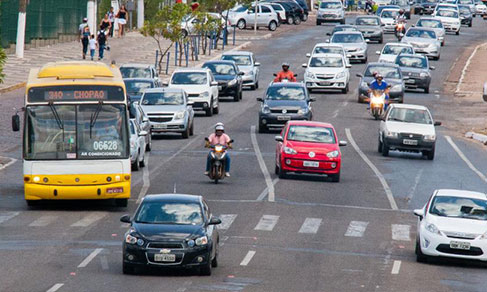Nossos serviços estão apresentando instabilidade no momento. Algumas informações podem não estar disponíveis.
PNS - National Survey of Health
About - 2013 Access and Use of Health Services, Accidents and Violent Occurrences
IBGE, in this publication, presents a sequence to the National Survey of Health, conducted in partnership with the Ministry of Health.
This thematic volume brings a brief description of the survey, the sampling plan and comments on the health conditions of the Brazilian population, focusing on aspects related to the access and use of health services, coverage of the Family Health Program, health insurance coverage, oral health, traffic accidents and violent occurrences, together with other topics and indicators, for example, perception of discrimination in health services, presence of cats and dogs in the housing unit, vaccination of animals and dengue fever. The results on housing unit characteristics, also available in the current edition, lead to knowledge on the needs and on the access of the population to health services in association with traditionally social and demographic variables, and contextual indicators for housing and sanitation. The glossary at the end of the publication gathers terms and concepts considered relevant to the understanding of survey results.
The enclosed CD-ROM reproduces the printed volume and includes complementary tables with information disaggregated by sex, age groups, level of schooling and color or race, for Brazil, Major Regions and Federation Units. For the capital municipalities and the Federal District, estimates are divided into overall results and results by sex. In addition to tables with their respective indicators and confidence intervals, the publication also presents tables with absolute figures and coefficients of variation for the estimates.
Other thematic volumes of survey results will be released at proper time.
With the release of one more database, the Ministry of Health and IBGE expand considerably the knowledge on the health characteristics of the Brazilian population, thus providing executive ad legislative bodies, professionals and researchers, Health Councils, etc., with information needed for the formulation, monitoring and evaluation of policies related to this important sector.
Main results - 2013 Access and Use of Health Services, Accidents and Violent Occurrences
#tabelasidra20176515304897
#tabelasidra20176515325471
#tabelasidra20176515359144
#tabelasidra201765153828147
#tabelasidra201765154133202
The IBGE adopts a review policy of the data disclosed by this statistical operation. Data review means any and all scheduled revision of numerical data due to new information, which was not accessible at the time of the first disclosure. For instance: late data that replaces a non-response; or data corrected by the informant himself; or a set of data that has undergone editing and imputation. For more detailed information about the published data review policy of the IBGE statistical operations, check the list of short-term, long-term and special surveys carried out by the Institute with their respective revision procedure on: https://biblioteca.ibge.gov.br/index.php/biblioteca-catalogo?view=detalhes&id=298009.
Tables - 2013 Access and Use of Health Services, Accidents and Violent Occurrences
Complete Tables (xls)
- Household information, Household visits of Family Health Team and Endemic Disease Control Agents (xls | ods)
- Use of Health Services (xls | ods)
- Health Insurance Coverage (xls | ods)
- Oral Health (xls | ods)
- Medical Care (xls | ods)
- Accidents and Violence (xls | ods)
Complete tables (ods)
- Houseold information, Household visits of Family Health Team and Endemic Disease Control Agents
- Use of Health Services
- Health Insurance Coverage
- Oral Health
- Medical Care
- Accidents and Violence
The IBGE adopts a review policy of the data disclosed by this statistical operation. Data review means any and all scheduled revision of numerical data due to new information, which was not accessible at the time of the first disclosure. For instance: late data that replaces a non-response; or data corrected by the informant himself; or a set of data that has undergone editing and imputation. For more detailed information about the published data review policy of the IBGE statistical operations, check the list of short-term, long-term and special surveys carried out by the Institute with their respective revision procedure on: https://biblioteca.ibge.gov.br/index.php/biblioteca-catalogo?view=detalhes&id=298009.
Concepts and methods - 2013 Access and Use of Health Services, Accidents and Violent Occurrences
As informações a seguir descrevem os metadados estatísticos, que são o conjunto de conceitos, métodos e aspectos relacionados às estatísticas, e são informações necessárias para compreender as características e a qualidade das estatísticas e interpretá-las corretamente.
Informações Gerais
Objetivo
O objetivo desta pesquisa é produzir, para o país, dados sobre a situação de saúde e os estilos de vidada população brasileira. Visa também obter informações sobre a atenção à saúde, no que se refere ao acesso e uso dos serviços de saúde, à continuidade dos cuidados e ao financiamento da assistência de saúde.Tipo de operação estatística
Pesquisa domiciliar de saúdeTipo de dados
Dados de pesquisa por amostragem probabilísticaPeriodicidade de divulgação
QuinquenalPopulação-alvo
População residente nos domicílios particulares (permanentes e improvisados), nas áreas urbana e rural.Metodologia
Técnica de coleta:
CAPI - Entrevista pessoal assistida por computadorTemas
Temas e subtemas
SaúdePrincipais variáveis
As principais características investigadas:A) Características da habitação
- espécie do domicílio;
Para os domicílios particulares permanentes:
- material das paredes, pisos e cobertura do prédio;
- número de cômodos e de dormitórios;
- forma de abastecimento de água e esgotamento sanitário;
- destino do lixo;
- combustível utilizado para cozinhar;
- forma de iluminação;
- existência de linha telefônica; e
- existência de bens duráveis - filtro, fogão, geladeira, máquina de lavar roupa, microcomputador, DVD e televisão.
B) Características demográficas gerais:
- sexo;
- idade;
- cor ou raça; e
- condição no domicílio e na família;
C) Características de fecundidade feminina:
- número de filhos nascidos vivos, por sexo;
- número de filhos nascidos mortos, por sexo;
- número de filhos que estavam vivos, por sexo; e
- data de nascimento e sexo do último filho nascido vivo.
E) Características de educação:
- alfabetização;
- escolarização;
- série e grau frequentados pelos estudantes; e
- última série concluída, grau correspondente e conclusão do curso para pessoas que não são estudantes.
F) Características de trabalho e rendimento:
- condição de atividade e de ocupação na semana de referência e no período de referência de 365 dias;
- ocupação, atividade, posição na ocupação, categoria do emprego nos trabalhos principal e secundário da semana de referência, no trabalho principal do período de 365 dias ou no último trabalho do período de referência de cinco anos;
- rendimento e horas trabalhadas nos trabalhos principal e secundário e em outros trabalhos da semana de referência;
- contribuição para instituto de previdência nos trabalhos principal e secundário e em outros trabalhos da semana de referência e no trabalho principal dos 365 dias;
- tempo de permanência no trabalho principal da semana de referência e no trabalho principal do período de referência de 365 dias;
- setor do emprego e área do emprego público nos trabalhos principal e secundário da semana de referência e no trabalho principal dos 365 dias;
- tempo gasto do domicílio para o trabalho, local de estabelecimento do empreendimento e número de pessoas ocupadas no empreendimento do trabalho principal da semana de referência;
- relação com o empreendimento dos conta própria e empregadores em atividade agrícola no trabalho principal da semana de referência e no trabalho principal do período de referência de 365 dias;
- forma de remuneração, recebimento de auxílios (alimentação, transporte, educação e saúde) e jornada diurna ou noturno do emprego no trabalho principal da semana de referência;
- associação a sindicato, contribuição para previdência privada e idade com que começou a trabalhar das pessoas ocupadas no período de referência de 365 dias;
- recebimento do seguro-desemprego das pessoas sem trabalho na semana de referência que saíram do último emprego no período de referência de 365 dias;
- condição de aposentado, pensionista e cuidar dos afazeres domésticos, independentemente da condição de atividade; e
- rendimentos não oriundos de trabalho, independentemente da condição de atividade.
Unidades de informação
Unidade de investigação
PessoaUnidade de análise
Pessoa.Períodos de referência
Semana - 21/07/2013 a 27/07/2013
Mês - 01/07/2013 a 31/07/2013
Mês - 28/06/2013 a 27/07/2013
Disseminação
Formas de disseminação
Publicação Digital (online), CD-ROM com microdados, Microdados no Portal do IBGE, Publicação impressa com CD-ROMNível de desagregação geográfica
Região MetropolitanaNível de divulgação
Brasil, Grandes Regões, Unidades da Federação, Região Metropolitanas.Instrumentos de coleta
Saiba mais
https://metadados.ibge.gov.br/consulta/estatisticos/operacoes-estatisticas/XNPublications - 2013 Access and Use of Health Services, Accidents and Violent Occurrences
Description
The National Survey of Health - PNS aimed at collecting information on the performance of the national health system in terms of access and use of available services and of continuity of care. It also investigates the population's health conditions, records of chronic non-communicable diseases and respective risk factors.
Microdata
- Microdata Files of PNS 2013 (zipped) - updated on August 25, 2020
- Documentation
- Previous projections
Updates
August 25, 2020: Change in the microdata and documentation files.
Merger of the household and person microdata. Change in the microdata and dictionary read files. Adjustment of the questionnaire according to the dictionary. Inclusion of derived variables VDD4004A, VDF002 and VDF003. Change in the variables for sample expansion due to the 2018 Revision of the Population Projection of the Federation Units, by Sex and Age, for the 2010-2060 period, carried out by the IBGE.
March 23, 2017: Change in the PNS 2013 questionnaire on March 23, 2017: Adjustment of the questionnaire to the variables, according to the dictionary.
December 2, 2016: Change on December 2, 2016: Inclusion of modules in the persons microdata and change in file in folder Methodology.
Inclusion of the variables of module F in the persons microdata, according to the release calendar of PNS 2013. Amendment of the reading of variable E01201 in the persons microdata; previously, the variable had a 0 digit on the right of the code. Change in the file "Ocupação COD.xlsx" in folder Methodology.
September 6, 2016: Change on September 6, 2016: File "Notas Metodológicas.pdf" was renamed as "Plano Amostral PNS 2013.pdf".
August 31, 2016: Change on August 31, 2016: Inclusion of files (Household CNAE 2.0 Activity and COD Employment) in folder Methodology.
June 30, 2016: Inclusion of modules in the persons microdata. Inclusion of the variables of modules E and M in the persons microdata, according to the release calendar of PNS 2013.
May 12, 2016: Inclusion of module W, exclusion of variable O026 in the persons microdata and documentation on estimates of anthropometry and blood pressure.
Inclusion of the variables of W module related to anthropometry in the persons microdata. Exclusion of variable O026 in the persons microdata. Inclusion of documentation on estimates of anthropometry and blood pressure.
August 21, 2015: Inclusion of the variables of modules G, K, L, R and S in the persons microdata, according to the release calendar of PNS 2013.
Exclusion of the information on housing units in 10 records.
During the generation of the microdata file of housing units, available on the IBGE portal, information rejected in the data edit were unduly included in 10 records. It is important to stress that the estimate did not take into account these records. In other words, these records were not taken into account in the generation of the indicators produced and released, based on the National Survey of Health. Therefore, the table plan and other products available are correct.
June 2, 2015: Inclusion of modules in the microdata of housing units and persons.
Inclusion of the variables of modules A and B in the housing units microdata and variables of modules I, J, O, U and X in the persons microdata, according to the release calendar of PNS 2013.
March 27, 2015: Replacement of variable V0006 by V0006_PNS in the microdata of housing units and persons.
Replacement of variable V0006 (Order number of the housing unit) by V0006_PNS (Order number of the housing unit in PNS). Therefore, the switching of PNS 2013 is now to housing unit information: V0001 (Federation Unit), V0024 (Stratum), UPA_PNS (UPA) and V0006_PNS (Order number of the housing unit in PNS); and to resident information: V0001 (Federation Unit), V0024 (Stratum), UPA_PNS (UPA), V0006_PNS (Order number of the housing unit in PNS) and C00301 (Order number of resident).
February 12, 2015: Inclusion of the variables of module P in the persons microdata.
Inclusion of quantitative variables of module P related to smoking. The variables refer to items P54 and P58.
February 3, 2015: Inclusion of variables in the microdata of housing units and persons.
Inclusion of variable 'UPA' in the microdata of housing units and persons. Variable 'UPA' is the unified code of UPA of the Integrated System of Household Surveys.
Inclusion of variable 'M010' in the persons microdata. This variable belongs to a non-disclosed module, though it is needed to compute the indicator, already released, on smoke exposure in the work environment.
December 12, 2014: Exclusion of the information of a specific part of a selected resident in 12 records.
During the generation of the microdata file of persons, available on the IBGE portal, information rejected in the data edit of a specific part of a selected resident was unduly included in 12 records.
It is important to stress that the estimate did not take into account these records. In other words, these records were not taken into account in the generation of the indicators produced and released, based on the National Survey of Health.
Therefore, the table plan and other products available are correct.
Downloads
Technical Information
Methodological considerations on the National Survey of Health - PNS can be obtained in the Technical notes chapter of the results publications.
News and Releases
2019
In an unprecedented survey by the IBGE, 2.9 million adults reported being homosexual or bisexual in 2019
Approximately 2.9 million persons reported being homosexual or bisexual, in the country, in 2019, which...
25/05/2022
2019
PNS 2019: Brazil has 17.3 million persons with some type of disability
In 2019, according to the National Survey of Health (PNS), 17.3 million persons aged two and over (8.4%...
26/08/2021
2019
One out of every four elderly persons had some time of disability according to data of 2019
Almost half (49.4%) of the 17.3 million persons with disabilities 17,3 in Brazil in 2019 were elderly,...
26/08/2021
2019
PNS 2019: in one year, 29.1 million persons aged 18 and over experienced psychological, physical or sexual violence in Brazil
According to estimates from the National Survey of Health (PNS) 2019, about 18.3% (or 29.1 million) of...
07/05/2021
2019
Only 54.6% of the adults wore a seat belt in when in the back seat of the car in 2019
Four out of every five persons aged 18 and over reported, in 2019, wearing a seat bel in the front seat...
07/05/2021
2019
A total of 29.1 million were affected by violence in 2019, with women, youth and black population as the main victims
In 2019, 29.1 million persons aged 18 and over experienced psychological, physical or sexual violence,...
07/05/2021
2019
PNS 2019: consumption of tobacco drops, alcoholic beverages increases
Smoking is declining in Brazil, yet the consumption of alcohol has been increasing, especially among...
18/11/2020
2019
Leveraged by women, consumption of alcohol increases among Brazilians in 2019
Brazilians are consuming more alcoholic beverages. Or rather, women: 17% of adult women stated to have...
18/11/2020
2019
PNS 2019: Frequent users of SUS see quality of its Primary Health Care Services mostly positive
In 2019, for the first time, the National Survey of Health (PNS) collected information on Primary Health...
21/10/2020
2019
One out of every four adults in Brazil were obese in 2019 and primary health care was positively evaluated
The percentage of obese adults in Brazil more than doubled in 17 years, with a change from 12.2%, between...
21/10/2020
Errata
Correction of variable labels in the PNS public dictionary
Published date: 14/01/2022
Description:
Correction of labels in the categories of variables J002, K034, L039, M009, P053, P05411, P05412, Q04708, Q04709, Q04710, Q04711, R02101, V003 in the PNS 2019 dictionary.Actions: The file was corrected and replaced.
Amendment in labels of variable K028 included in public dictionary of PNS 2019
Published date: 09/11/2021
Description:
Amendment of the labels of the categories of variable K028 in the PNS 2019 dictionary
1) Amendment of the categories of K028
From:
1 - No difficulty
2 - Some difficulty
3 - Much difficulty
4 - Cannot make it in any way
5 - Does not use medicines
9 - Ignored
- Not applicableTo:
1 - Cannot make it
2 - Has much difficulty
3 - Has slight difficulty
4 - Does not have any difficulty
5 - Does not use medicines
9 - Ignored
- Not applicableActions: The file was amended and replaced.
Label correction of variable V03501 listed in the public dictionary of the 2019 National Survey of Health
Published date: 21/10/2021
Description:
Label correction of the categories of variable V03501 in the 2019 PNS dictionary
1) Correction of categories of V03501
Reads:
1 -
2 -
Should read:
1 – Yes
2 - NoActions: File corrected and replaced.
Indicators amended in the table plan on Anthropometry – 2019 National Survey of Health: Primary health care and anthropometric information – Brazil
Published date: 23/07/2021
Description:
Tables, originally in xls and ods, were replaced with tables SIDRA 8171 and 8172, with indicators related to anthropometry, were recalculated.Actions: Tables amended and replaced.
Calendar error in the release of the National Survey of Health
Published date: 09/12/2020
Description:
The IBGE postponed the release of the National Survey of Health 2019 - Labor conditions and relations, AA module, scheduled for December 11. The technical area will carry out additional consultations and surveys to assure the same quality and precision of the data, a tradition at the IBGE, complying with statistical principles.Actions: The release calendar was changed.
Amendment in the 2019 PNS microdata
Published date: 29/10/2020
Description:
Correction of the microdata file referring to the 2019 PNS to recover twelve variables that incorrectly presented missing values for some records.Actions: Microdata file amended.
Error on the release date of the 2019 National Survey of Health - Perceived health status, life style, chronic diseases and oral health
Published date: 22/10/2020
Description:
The IBGE will bring the results forward to November 18 of 2020. Initially, the release date would be December 18 of 2020.Actions: The release calendar was amended.
Replacement of the PDF publication of the National Survey of Health - 2013 - Access and use of health services, accidents and violent occurrences
Published date: 01/02/2017
Description: Graphs 14 and 15 of the publication had the wrong titles.
Actions: File corrected and replaced on the IBGE website.
Replacement of the Publication PNS 2013 - Life cycles - Brazil and Major Regions
Published date: 21/08/2015
Description: Amendment of a typing error at page 39 of the printed publication
Actions: Errata included in the printed publication. Publication replaced before its release on the Internet.
Replacement of the Publication PNS 2013 - Life cycles - Brazil and Major Regions
Published date: 21/08/2015
Description: Amendment of a typing error at page 39 of the printed publication
Actions: Errata included in the printed publication. Publication replaced before its release on the Internet.
Replacement of the printed publication to include errata in the PNS 2013 - Access and Use of Health Services, Accidents and Violent Occurences Brazil, Major Regions and Federation Units
Published date: 02/06/2015
Description: Amendment of the reference period in the title of graph 27; includes the confidence interval in graph 64 to estimate female persons who use any type of dental prosthesis; and includes the complementary and integrative practices entry in the glossary.
Actions: Errata included in the publication.
Replacement of the printed publication to include errata in the PNS 2013 - Access and Use of Health Services, Accidents and Violent Occurences Brazil, Major Regions and Federation Units
Published date: 02/06/2015
Description: Amendment of the reference period in the title of graph 27; includes the confidence interval in graph 64 to estimate female persons who use any type of dental prosthesis; and includes the complementary and integrative practices entry in the glossary.
Actions: Errata included in the publication.












